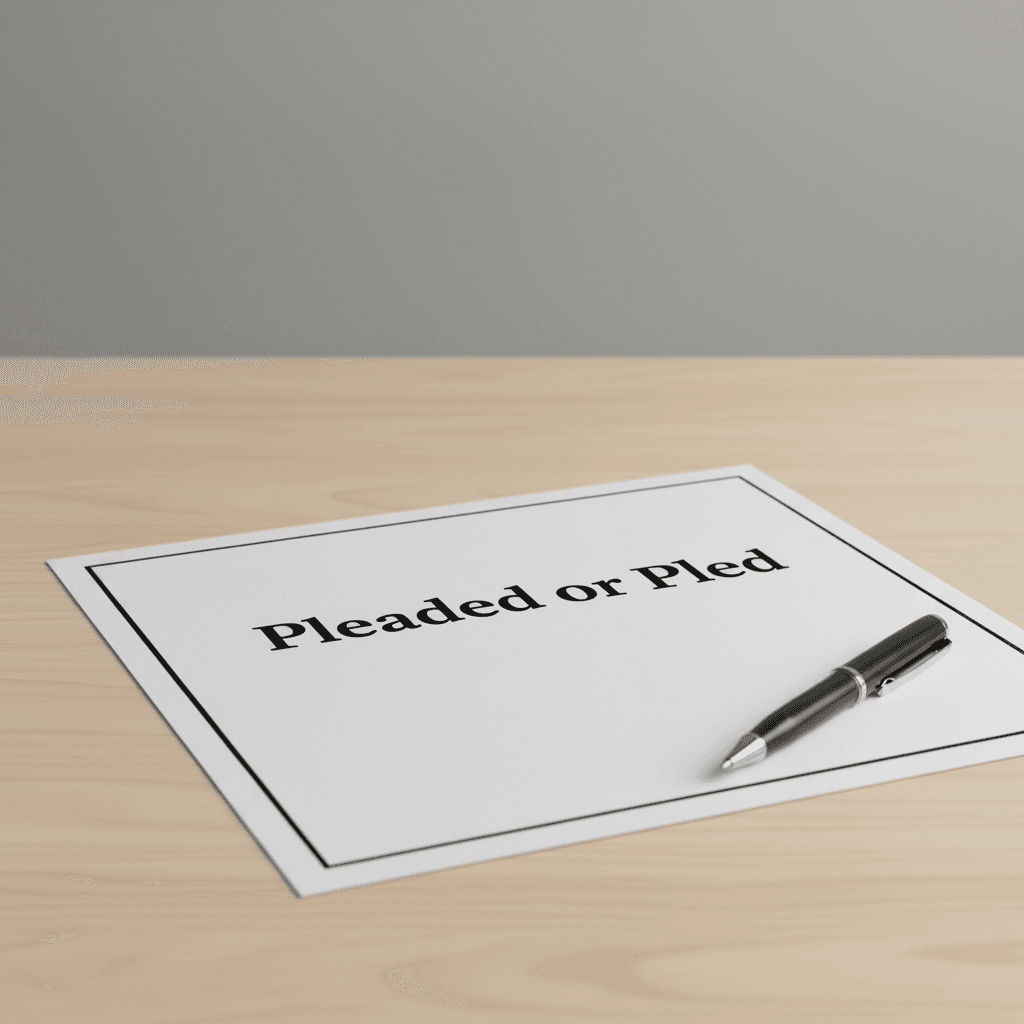Pleaded vs. Pled: What’s the Difference?
 The words pleaded and pled are both past tense forms of plead, meaning to make a request or to state guilt or innocence in court.
The words pleaded and pled are both past tense forms of plead, meaning to make a request or to state guilt or innocence in court.
So, which one is correct?
Here’s the short rule:
- Pleaded → preferred in formal, written, and legal English ✅
- Pled → common in informal or American speech 🇺🇸
1. Pleaded: The Standard Form
Meaning
“Pleaded” is the traditional and most widely accepted past tense of plead in both British and American English.
It’s the form you’ll see in legal documents, news reports, and formal writing.
Examples (10 total)
- The defendant pleaded guilty to all charges.
- She pleaded for another chance.
- The lawyer pleaded his client’s innocence.
- He pleaded with her to stay.
- The man pleaded not guilty in court.
- The child pleaded for forgiveness.
- The victim pleaded for help.
- She pleaded that she was misled.
- The suspect pleaded guilty yesterday.
- They pleaded with the judge for leniency.
🧠 Tip:
If you’re writing formally or in legal contexts, always use pleaded.
“He pleaded guilty” is the standard phrase in law.
2. Pled: The Informal Variant
Meaning
“Pled” is a more informal or regional version of pleaded, especially common in spoken American English and some Scottish or Irish dialects.
It’s grammatically accepted but less formal.
Examples (10 total)
- He pled guilty to the lesser charge.
- She pled with her parents to let her go.
- The suspect pled not guilty.
- They pled for understanding.
- The man pled for mercy.
- I pled my case to the teacher.
- She pled for another chance.
- The defendant pled innocence.
- He pled before the court.
- We pled for peace.
🧠 Tip:
If you’re writing casually, pled is fine — but avoid it in formal essays or legal documents.
3. Quick Comparison Table
| Use | Pleaded | Pled |
|---|---|---|
| Formality | Formal, legal, standard | Informal, conversational |
| Region | Used globally | Mainly U.S. & Scotland |
| Common in law | ✅ Yes | ❌ No (less standard) |
| Example | The suspect pleaded guilty. | The suspect pled guilty. |
| Best for writing | Academic, news, courts | Dialogue, casual tone |
4. In Legal Writing
In law, pleaded is the official and accepted form in nearly all English-speaking countries.
You’ll see phrases like:
- He pleaded guilty.
- The defendant pleaded not guilty.
Even though pled guilty appears in some U.S. court reports, major style guides (like AP, Chicago, and Oxford) recommend pleaded for clarity and consistency.
5. How to Remember
👉 Pleaded = formal and safe in all cases.
👉 Pled = casual or regional speech.
💡 Memory Trick:
“Pleaded” sounds complete and polished — use it when writing.
“Pled” sounds quick — like something you’d say, not write.
6. Common Mistakes
❌ He has pleded guilty.
✅ He has pleaded guilty.
❌ The lawyer pleded for justice.
✅ The lawyer pleaded for justice.
❌ She has pled guilty yesterday.
✅ She pleaded guilty yesterday.
7. Why It’s Confusing
English verbs ending in -ead (like lead → led) usually shorten in the past tense.
That’s why pled sounds natural — but plead is irregular and doesn’t fully follow that rule.
Over time, both forms became acceptable, but pleaded stayed the official standard.
Modern grammar assistants like Humanizey even recognize both, but suggest pleaded for formal or professional tone.
FAQs
1. Is “pled guilty” wrong?
No — it’s common in the U.S., but “pleaded guilty” is preferred in formal writing.
2. Do British people use “pled”?
Rarely. British English almost always uses pleaded.
3. Which is used more in court documents?
Pleaded — it’s the official legal form in most jurisdictions.
4. Can I use both in writing?
Technically yes, but it’s best to stick with pleaded unless writing dialogue or informal text.
Practice: Choose the Correct Form (“Pleaded” or “Pled”)
(Answers are listed at the end.)
- The defendant ___ guilty to two charges.
- She ___ with her boss to reconsider.
- The man ___ for forgiveness.
- The lawyer ___ his client’s innocence.
- They ___ not guilty in court.
- He ___ guilty after seeing the evidence.
- The woman ___ for help when trapped.
- The suspect ___ that he was framed.
- I ___ with them to stay.
- The defendant ___ guilty this morning.
Answers
- pleaded
- pleaded / pled (both acceptable)
- pleaded
- pleaded
- pleaded
- pleaded
- pleaded
- pleaded
- pleaded / pled (both okay)
- pleaded
